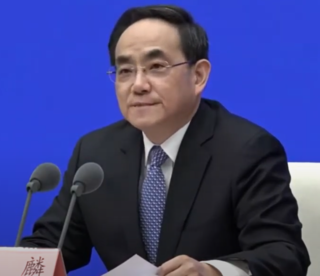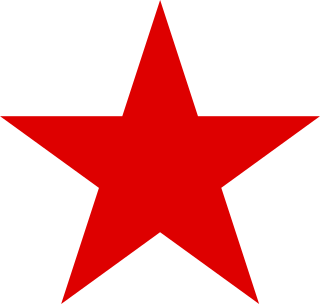
The State Council Information Office is the chief information office of the State Council of the People's Republic of China and an external name of the Central Propaganda Department of the Chinese Communist Party.

The Foreign Affairs Commission of the Central Committee of the Chinese Communist Party, commonly called the Central Foreign Affairs Commission, is a commission of the Central Committee of the Chinese Communist Party (CCP) that exercises general oversight on matters related to foreign affairs.

The Publicity Department of the Central Committee of the Communist Party of China, also known as the Propaganda Department or Central Propaganda Department, is an internal division of the Central Committee of the Chinese Communist Party (CCP) in charge of spreading its ideology, media regulation, as well as creation and dissemination of propaganda. The department is also one of the main entities that enforces media censorship and control in the People's Republic of China.

The Central Political and Legal Affairs Commission (CPLC), commonly referred to as Zhongyang Zhengfawei in Chinese, is the organization under the Central Committee of the Chinese Communist Party (CCP) responsible for "political and legal affairs". Based on the principles of Leninism and democratic centralism, the organization acts as the overseer and coordinator of all legal enforcement authorities, including the Ministries of State Security, Public Security and Justice, as well as the Supreme People's Court and Supreme People's Procuratorate. All provincial, municipal, county and autonomous region CCP committees have their own political and legal affairs commissions.

Lu Wei is a former Chinese politician. He served as the deputy head of the Propaganda Department of the Chinese Communist Party, the head of the General Office of the Central Leading Group for Internet Security and Informatization from August 2013 to June 2016. Lu was previously Vice-Mayor of Beijing and the head of the Beijing Party organization's propaganda department, among other posts. Lu was named by Time magazine as one of the world's 100 most influential people in 2015. Multiple charges brought in 2017 resulted in Lu being sentenced to fourteen years in prison in 2019.

The Central Financial and Economic Affairs Commission is a commission of the Central Committee of the Chinese Communist Party in charge of leading and supervising economic work of both the CCP Central Committee and the State Council. The Commission is generally headed by CCP General Secretary or Premier of the State Council.

The Central Leading Group for Taiwan Affairs is an internal policy coordination group of the Central Committee of the Chinese Communist Party, reporting to the Politburo of the Chinese Communist Party, in charge of supervising and coordinating China's policy of unification towards Taiwan. It was established in 1979 and has been led by the General Secretary of the Chinese Communist Party since 1989.

The Central Leading Group for Propaganda, Ideological and Cultural Work is a leading small group of the Central Committee of the Chinese Communist Party (CCP) responsible for nationwide propaganda.

The Central Comprehensively Deepening Reforms Commission (CCDR), also translated as the Central Commission for Deepening Reform, is a policy formulation and implementation body of the Central Committee of the Chinese Communist Party (CCP) in charge of "Comprehensively Deepening Reforms". These reforms are intended to be even more far-reaching than the previous round of comprehensive Chinese economic reforms initiated by Deng Xiaoping.

The Leading Group for National Defence and Military Reform of the Central Military Commission is a policy formulation and implementation body set up under the Central Military Commission and ultimately answerable to the Central Committee of the Chinese Communist Party for the purpose of formulating policies related to military reform. The group is headed by Xi Jinping, General Secretary of the Chinese Communist Party and Chairman of the Central Military Commission.

Liu He (simplified Chinese: 刘鹤; traditional Chinese: 劉鶴; pinyin: Liú Hè; Wade–Giles: Liu2 Ho4; lit. 'Liu Crane'; born 25 January 1952) is a Chinese economist and retired politician who served as a vice premier of the People's Republic of China from 2018 to 2023. Additionally, he served as the director of the Office serving the Central Financial and Economic Affairs Commission of the Chinese Communist Party (CCP) from 2013 to 2023, the director of the Financial Stability and Development Committee from 2017 to 2023, as well as a member of the Politburo of the Chinese Communist Party from 2017 to 2022.

The Central Leading Group for Inspection Work is a coordination body set up under the Central Committee of the Chinese Communist Party for the purpose of managing party disciplinary inspections nationwide.

The Central Leading Group on Hong Kong and Macau Affairs is an internal policy coordination group of the Central Committee of the Chinese Communist Party (CCP), reporting to the CCP Politburo, in charge of supervising and coordinating Beijing's policy towards the Special Administrative Regions of Hong Kong and Macau.

The Li Keqiang Government was the Central People's Government of China from 15 March 2013, when Premier Li Keqiang took office, until March 2023. It succeeded the Wen Jiabao government. Premier Li is ranked only second to Party general secretary Xi Jinping among 7 members of the 18th and 19th Politburo Standing Committee, top decision-making body of the Chinese Communist Party (CCP).

The Cyberspace Administration of China is the national internet regulator and censor of the People's Republic of China.

Xu Lin is a Chinese politician, who is currently serving as the Communist Party secretary of Guizhou. Previously he served as director of the State Council Information Office and director of the National Radio and Television Administration. He also served as the main official in charge of internet policy, the head of the Cyberspace Administration of China, from June 2016 to July 2018. Xu was previously the head of the Shanghai propaganda department and later Chinese Communist Party Committee Secretary of Pudong.

The Belt and Road construction leadership group is the review and coordination body established by the State Council of the People's Republic of China to promote the Belt and Road Initiative. State Council leader Han Zheng is the core and the China National Development and Reform Commission is the main body.

The Cybersecurity Law of the People's Republic of China, commonly referred to as the Chinese Cybersecurity Law, was enacted by the National People’s Congress with the aim of increasing data protection, data localization, and cybersecurity ostensibly in the interest of national security. The law is part of a wider series of laws passed by the Chinese government in an effort to strengthen national security legislation. Examples of which since 2014 have included a Law on National Intelligence, the National Security of the People’s Republic of China and laws on counter-terrorism and foreign NGO management, all passed within successive short timeframes of each other.
Zhuang Rongwen is a Chinese politician, currently serving as director of the Cyberspace Administration of China, director of the Office of the Central Cyber Security and Informatization Commission, deputy director of the State Council Information Office, and deputy head of the Publicity Department of the Chinese Communist Party.

The Central Rural Work Leading Group is a coordination body set up under the Central Committee of the Chinese Communist Party for the purpose of managing rural affairs.











